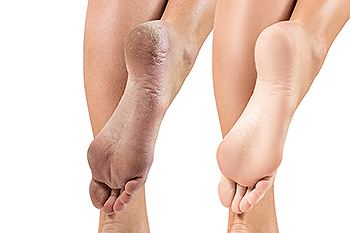
Cracked heels, a prevalent foot ailment, unfold as a result of a combination of factors intricately linked to foot care and lifestyle. The skin on the heels is naturally drier and thicker, making it prone to dehydration, especially in areas with low humidity or during seasons such as winter. Lack of proper hydration and moisturization contributes significantly to the development of cracked heels. Prolonged standing or walking on hard surfaces adds to the pressure on the feet, leading to the formation of calluses that may eventually crack. Wearing ill-fitting footwear, with open-back shoes being a common factor, exposes the heels to friction and worsens the condition. Medical conditions like eczema, psoriasis, or thyroid disorders can also contribute to skin dryness, increasing the risk of cracked heels. If you have developed problematic cracked heels, it is suggested that you consult a podiatrist who can offer you effective relief options, which may include prescribed medicine.
Cracked heels are unsightly and can cause further damage to your shoes and feet. If you have any concerns, contact Dr. Richard T. Bauer from Summit Foot & Ankle. Our doctor can provide the care you need to keep you pain-free and on your feet.
Cracked Heels
Cracked heels appear unappealing and can make it harder for you walk around in sandals. Aside from looking unpleasant, cracked heels can also tear stockings, socks, and wear out your shoes. There are several methods to help restore a cracked heel and prevent further damage.
How Do You Get Them?
Dry skin is the number one culprit in creating cracked heels. Many athletes, walkers, joggers, and even swimmers suffer from cracked heels. Age and skin oil production play a role to getting cracked heels as well.
Promote Healing
Over the counter medicines can help, especially for those that need instant relief or who suffer from chronic dry feet.
Wear Socks – Wearing socks with medicated creams helps lock in moisture.
Moisturizers – Applying both day and night will help alleviate dryness which causes cracking.
Pumice Stones – These exfoliate and remove dead skin, which allows for smoother moisturizer application and better absorption into the skin.
Change in Diet
Eating healthy with a well-balanced diet will give the skin a fresh and radiant look. Your body responds to the kinds of food you ingest. Omega-3 fatty acids and zinc supplements can also revitalize skin tissue.
Most importantly, seek professional help if unsure how to proceed in treating cracked heels. A podiatrist will help you with any questions or information needed.
If you have any questions, please feel free to contact our office located in Latham, NY . We offer the newest diagnostic and treatment technologies for all your foot care needs.
